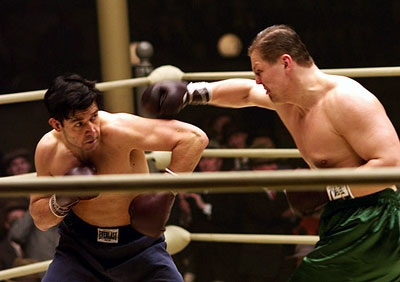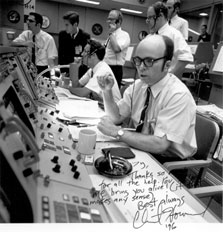
I know the question asked above makes me sound like a snob, but his films, despite their life/victory-or-death/defeat subject matters, can easily slide to the back of the cupboard. As much as I liked Cocoon (1985), Backdraft (1991) and A Beautiful Mind (2001), they are not films I'm eager to revisit. But then I'm reminded, again via the Internet Movie Database, that he has made some movies that stick with me. I guess there's something about seeing them all lined up that way on IMDB, but I know I'm a happier moviegoer because of, for instance, Night Shift (1982), just to watch Michael Keaton go nuts, as he examines the etymology of the word prostitution ("... and there's "shun," to push away ... Well, that doesn't really belong here."), and has yet another brainstorm: feed tuna mayonnaise to get tuna salad in the can ("Bill to self: Call Starkist."). And the weird thrill of Daryl Hanna as a mermaid--oh, not so weird, I guess. And of course his masterpiece, as far as I'm concerned: Apollo 13 (1995), the perfect marriage of all those TV-friendly faces--Tom Hanks, Kevin Bacon, Bill Paxton, Gary Sinise, Ed Harris--playing my favorite subcategory of hero: supernerds, their white short-sleeved shirts and horn-rimmed glasses gleaming and glinting as they buckle down and solve problems, no whining allowed. Howard paces the action beautifully, with a good eye for NASA both on and out of this world.

I think he gets close to this kind of solidity in Cinderella Man, especially in his casting. Russell Crowe's Jim Braddock is a well-defined character--or at least type, played by Crowe without any fuss. But--and you're on the wrong page if you disagree with me--the real pleasure of this All-American nose-to-the-grindstone fable is Paul Giamatti's Paul Gould. He single-handedly puts this movie right where it belongs: somewhere between Damon Runyon and Sly Stallone, channeling a bit of the latter's Mickey (Burgess Meredith), but mostly creating a character that would be completely at home in any movie made during Cinderella Man's Depression-era setting. I can easily see him exchanging one-liners with Rosalind Russell, or trying to convince Bogart to lay off, see, if you know what's good for you. Or just tearing his hair out in some Preston Sturges pressure cooker. But his performance is not merely a great stunt--although in some ways that would be enough. He pulls Crowe--and Howard--into the '30s and asks the movie to see why the Depression worked the way it did, as decent men demurred from extending a hand and the worst things happened in an offhand way, business as usual. Gould is on a perch, watching the Depression take its toll--until he topples, too, and manipulates Braddock without malice but with forethought.

His presence in the boxing scenes illustrates his position in this movie. Can you mention a fight movie where the corner man hogs the spotlight? Giamatti is given permission to lift us out of our seats and plop us down ringside, where we can see the messy precision of a boxing match--but where we also can feel how high the stakes are. It becomes a movie about the toil involved in maintaining personal integrity, without forgetting the money. Again, the Depression looms even in the big match at the end. We've already seen that the lack of money makes a father break a promise to his son (Howard nicely keeping the problem personal without ignoring the fact that everyone we care about in this movie shares in the problem); losing for Braddock would not be the same as Rocky's loss. Stallone convinces us to focus on Rocky's moral victory; winning isn't everything. But Howard, perhaps closer to the system, knows how money changes everything--I'm reminded of George Bailey's $8000--but also asks us to watch Braddock and Gould's enthusiasm and conviction. So when the fight started, I knew if Braddock lost both men would face troubles, but that, win or lose, they had kept their promises to each other.

I don't care how sappy that sounds. This is why I think some Ron Howard movies, like Cinderella Man, might be--well, if not necessary, then helpful, occasionally, as I listen for a small still voice. The great thing about this movie is that Crowe gets to be the Quiet Man, while Giamatti lets us hear that voice--but not so small, and not still at all.

No comments:
Post a Comment